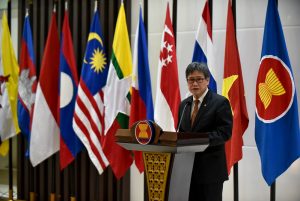Myanmar’s shadow National Unity Government (NUG) says that it no longer has any expectation that the Association of Southeast Asian nations (ASEAN) can help advance a solution to the country’s political crisis. During an online press conference on Friday, the NUG’s Deputy Foreign Minister Moe Zaw Oo said ASEAN must engage with both sides in the country’s dispute, but is currently only engaging with junta leaders.
“Frankly speaking, we no longer have any faith in ASEAN’s efforts, and we have no expectation,” Moe Zaw Oo said. He added that it appeared as if the Southeast Asian bloc “does not have a solid plan” for resolving the turmoil that has engulfed Myanmar since the military overthrew the elected National League of Democracy (NLD) government in February.
The comment came the same day as two regional envoys – ASEAN Secretary General Lim Jock Hoi and Erywan Pehin Yusof, Brunei’s second minister of foreign affairs – visited the country for meetings with junta leader Min Aung Hlaing and other senior officials. The trip was intended as a follow-up to the five-point consensus established by ASEAN during its special Leaders Meeting in Jakarta on April 24.
The five points called for the cessation of violence; “constructive dialogue” between the various parties; the appointment of an ASEAN special envoy; the facilitation of humanitarian aid; and the deployment of the special envoy to Myanmar to meet with the various contending parties.
But so far, ASEAN’s progress on the five points has stagnated, failing even to make much progress on what appears to be the most straightforward point of consensus: the appointment of a special envoy.
Moe Zaw Oo said the NUG had asked ASEAN “many times” what the bloc would do if Min Aung Hlaing failed to comply with the five points of consensus, and was unsatisfied. Shortly after the April 24 summit, the junta announced that the implementation of the five-point consensus would have to wait until it had achieved “the stability and security of the country.”
Moe Zaw Oo’s comments came as anti-coup protesters in Myanmar pointedly burnt the ASEAN flag to protest the bloc’s perceived culpability. “In building a new future federal nation, we, Myanmar citizens, have [nothing] to discuss or relate with this so-called ASEAN org where only unfairness is overwhelming,” said one student quoted by the journalist Cape Diamond on Twitter. One photo showed a protester holding up a poster that stated, “ASEAN way just means standing by USELESSLY.”
The NUG was established in mid-April in a bid to compete with the junta for international support and recognition. It includes the Committee Representing Pyidaungsu Hluttaw (CRPH), a group of NLD parliamentarians elected at last November’s national election, and representatives from ethnic minority organizations.
While numerous foreign governments have held talks with the NUG, none have recognized it as Myanmar’s legitimate government, a de facto recognition that whatever its lack of popular legitimacy, the military government remains in de facto control of the state. In ASEAN’s case, the bloc’s principle of consensus decision-making has effectively allowed Myanmar’s military junta to veto any official contact between ASEAN and opponents of the military.
For this reason, NUG representatives were not invited to the Jakarta meeting in April, and did not figure on the itinerary of Lim Jock Hoi and Erywan Pehin Yusof this weekend. While ASEAN has taken a lot of heat for engaging with the junta, the delegation did manage to send its strongest signals yet, even if the ultimately impact of its words remains unclear.
In a statement issued following the visit of the pair to Myanmar on Saturday, ASEAN stated that Yusof, who also serves as Chairman of the ASEAN Foreign Ministers’ Meeting, urged that Myanmar implement the five-point consensus and “called for the release of all political prisoners, including women and children and foreigners,” a demand that ASEAN has not been able to muster thus far. (A similar call was vetoed during the meeting on April 24.) Yusof also “submitted to Myanmar the nominations proposed by ASEAN Member States for the Special Envoy of the ASEAN Chair to Myanmar.”
Sure enough, the state mouthpiece Global New Light of Myanmar gave the meeting its own spin, claiming that the two sides “exchanged views” on “terror acts in Myanmar by associations and terrorist groups related to unlawful CRPH and NUG,” as well as “errors in voter lists and findings in inspection in the 2020 multiparty general election,” which the junta has cited as justification for its seizure of power.
Whether any of this goes anywhere remains to be seen, given that the Myanmar military will continue to hold an effective veto over the diplomatic process. But from ASEAN’s perspective, no progress is possible without engaging the guys with the guns – and for the bloc to insist on a place at the table for their opponents would be a sure way to grind all diplomatic efforts to a halt.

































